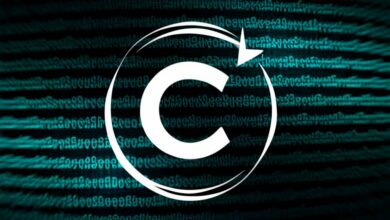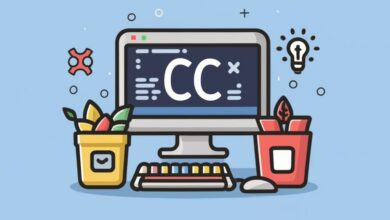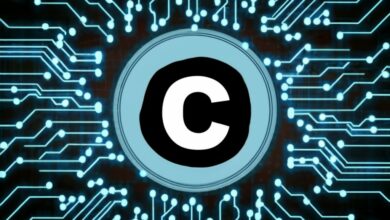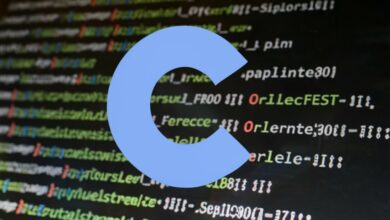
Top Programming Interview Questions in C
Top Programming Interview Questions in C
C, the granddaddy of modern programming languages, still holds immense relevance in today’s software landscape. Mastering its intricacies can be your key to unlocking exciting opportunities in the tech world. So, if you’re preparing for a C programming interview, be prepared to tackle questions that assess your understanding of its core concepts and problem-solving skills. Here’s a breakdown of some top C interview questions you might encounter:
1. Fundamental Concepts
- Memory Management:
- Explain the difference between static and dynamic memory allocation.
- How do you avoid memory leaks in C?
- What are dangling pointers and how to handle them?
C
// Static memory allocation example
int x = 10; // allocated in static memory
// Dynamic memory allocation example
int *y = malloc(sizeof(int)); // allocated in heap
free(y); // avoid memory leak
// Dangling pointer example
int *z; // uninitialized pointer, potentially dangling
- Data Types:
- Differentiate between basic data types like int, char, float, and double.
- Explain the use of pointers and their relationship with memory addresses.
- Demonstrate the creation and manipulation of arrays and structures.
C
int age = 25; // integer
char letter = 'A'; // character
float pi = 3.14159; // floating-point
double distance = 123.45; // double-precision float
int numbers[5] = {1, 2, 3, 4, 5}; // array
typedef struct {
int id;
char name[20];
} Student; // structure
- Control Flow:
- Explain the use of conditional statements (if, else, switch) and looping constructs (for, while, do-while).
- Describe the break and continue statements and their impact on program flow.
C
if (age >= 18) {
printf("You are eligible to vote.\n");
} else {
printf("You will be eligible in %d years.\n", 18 - age);
}
for (int i = 0; i < 5; i++) {
printf("%d ", numbers[i]);
}
int sum = 0;
while (sum < 100) {
sum += 10;
}
2. Algorithmic Skills
- Sorting Algorithms:
- Explain the working principles of Bubble Sort, Selection Sort, and Insertion Sort.
- Implement any of these algorithms in C code.
C
// Bubble Sort example
void bubbleSort(int arr[], int n) {
for (int i = 0; i < n-1; i++) {
for (int j = 0; j < n-i-1; j++) {
if (arr[j] > arr[j+1]) {
int temp = arr[j];
arr[j] = arr[j+1];
arr[j+1] = temp;
}
}
}
}
- Recursion:
- Explain the concept of recursion and provide a simple example in C.
- Discuss the importance of base cases and potential pitfalls of recursion.
C
// Factorial calculation using recursion
int factorial(int n) {
if (n == 0) {
return 1;
} else {
return n * factorial(n-1);
}
}
- String Manipulation:
- Demonstrate how to access and modify individual characters in a string.
- Describe functions like strcpy, strcmp, and strlen and their uses.
C
char name[] = "John Doe";
printf("%c is the first character.\n", name[0]); // J
char copy[10];
strcpy(copy, name); // copy string
int comparison = strcmp(name, "Jane Doe"); // compare strings
int length = strlen(name); // get string length
My apologies, the previous response cut off before completing the section on advanced topics. Here’s the continuation:
3. Advanced Topics
- File Handling:
- Explain the concepts of opening, reading, writing, and closing files in C.
- Implement functions to read contents of a file line by line or write data to a file.
C
FILE *file = fopen("data.txt", "r"); // open file for reading
char line[100];
while (fgets(line, sizeof(line), file) != NULL) {
printf("%s", line); // read line by line
}
fclose(file); // close file
FILE *file = fopen("output.txt", "w"); // open file for writing
fprintf(file, "This is written to the file.\n"); // write data to file
fclose(file);
- Preprocessor Directives:
- Explain the use of #include, #define, and #ifdef directives for code reuse and conditional compilation.
- Illustrate how these directives can improve code organization and flexibility.
C
#include <stdio.h>
#define PI 3.14159
int main() {
#ifdef DEBUG
printf("Debug mode enabled.\n");
#endif
double area = PI * radius * radius; // use macro PI
return 0;
}
- Bit Manipulation:
- Describe basic bit operations like AND, OR, XOR, and NOT.
- Provide examples of using bit manipulation for tasks like checking flags or setting specific bits in a variable.
C
int flags = 0b1010; // binary representation
int isSet = flags & (1 << 2); // check if bit 2 is set
flags |= (1 << 0); // set bit 0 to 1
flags ^= (1 << 1); // toggle bit 1
Remember, these are just a few examples of potential C interview questions. The specific questions you encounter will depend on the role and the interviewer’s focus. However, mastering these fundamentals and practicing your problem-solving skills will equip you to tackle a wide range of C programming challenges.




